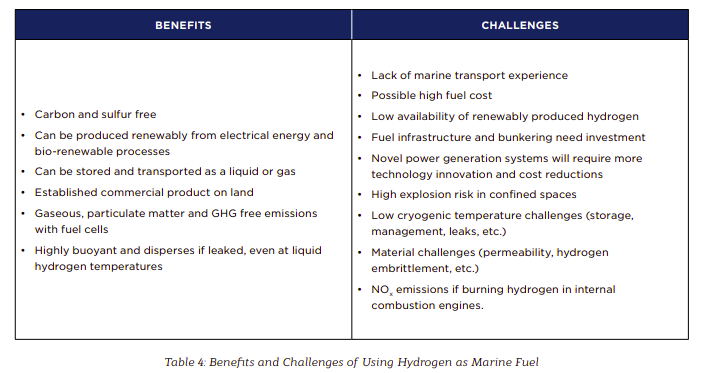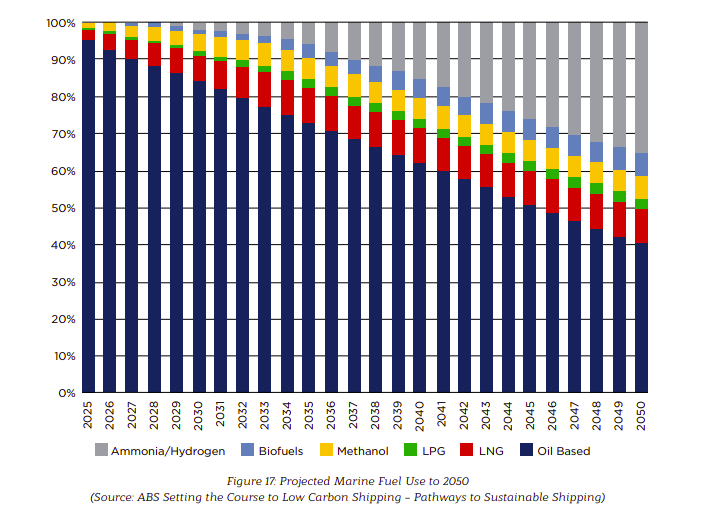As more experience is gained through hydrogen pilot projects, the marine industry is expected to adopt hydrogen as an environmentally friendly fuel of choice, according to a new whitepaper by ABS, part of its sustainability whitepapers series.
The Sustainability Whitepaper: Hydrogen as Marine Fuel explores the gas’ potential to reduce emissions from shipping, while evaluating its safety, regulatory and design implications.
While hydrogen appears to be an ideal fuel for power generation, it carries various challenges of advanced storage requirements and fire hazard mitigation. To become a competitive alternative marine fuel, hydrogen may also face the challenges of availability and high costs to scale production and transportation infrastructure,
…said Georgios Plevrakis, ABS Director, Global Sustainability.
 Currently, there are a few countries that have projected roles for hydrogen, the report shows. Unlike fossil-based petroleum marine fuels, which are exported from resource-rich countries to others around the world, hydrogen production in any country can secure an energy independent ecosystem. For this reason, national governments are developing agendas to include it in their energy plans, which may in turn help to quicken the pace of global hydrogen production, including the available hydrogen for marine fuel.
Currently, there are a few countries that have projected roles for hydrogen, the report shows. Unlike fossil-based petroleum marine fuels, which are exported from resource-rich countries to others around the world, hydrogen production in any country can secure an energy independent ecosystem. For this reason, national governments are developing agendas to include it in their energy plans, which may in turn help to quicken the pace of global hydrogen production, including the available hydrogen for marine fuel.
Australia’s independent standards recognize hydrogen’s potential role to decarbonize Australia, improve fuel security and create new investment and export opportunities, particularly to Japan, where the demand for hydrogen is growing for zero-emissions transport applications. The global demand for Australian exported hydrogen could reach one million tonnes by 2030 and a GDP growth of AUD $11 billion by the year 2050. Australia projects that hydrogen has the potential to transform the global energy market by partnering with international agencies to provide more support to develop the use of hydrogen.
[smlsubform prepend=”GET THE SAFETY4SEA IN YOUR INBOX!” showname=false emailtxt=”” emailholder=”Enter your email address” showsubmit=true submittxt=”Submit” jsthanks=false thankyou=”Thank you for subscribing to our mailing list”]
In Europe, the Renewable Energy Directive 2018/2001 (EU RED) states ambitious claims to source 32 percent of energy produced by member states from renewable sources by 2030. As a part of the European Clean Energy for all Europeans package, which followed the signing of the Paris Climate Agreement, the EU RED includes plans for the widespread uptake of hydrogen, focusing on sustainably sourced green hydrogen from renewables.
The EU Hydrogen strategy aims to install 6 GW of renewable hydrogen electrolyzers between 2020 and 2024, totaling production to up to one million tonnes of renewable hydrogen. By 2030, the strategy further integrates hydrogen into the energy system, with up to 40 GW of renewable hydrogen electrolyzers and total production increase up to 10 million tonnes.
Between 2030 and 2050, the goals increase so that renewable hydrogen is a mature industry and will become a large scale decarbonization solution for all sectors. Initiatives deriving from this EU directive and Hydrogen Strategy have already begun to fund initiatives, projects, and markets for renewable hydrogen in Europe, including hydrogen and fuel cell vessels and supporting renewable hydrogen infrastructure. The US also has plans for a hydrogen industry.
A Fuel Cell and Hydrogen Energy Association (FCHEA) report maps out how the US can transition to ambitiously adopt hydrogen into the widespread energy industry. The scenario states that hydrogen can be an economic growth driver and a tool for decarbonization with the assistance of federal regulations supported by states and local legislation. This optimistic scenario projects that US hydrogen demand will rise from 10 million tons to 17 million tons by 2030, and 63 million tons by 2050.

Hydrogen is characterized by having a very low tank-to-wake emissions impact, which considers the emissions produced by an energy source. However, the life cycle of hydrogen production must be considered to evaluate the overall emissions of GHG from hydrogen. As more experience is gained through hydrogen pilot projects, the marine industry is expected to adopt hydrogen as an environmentally friendly fuel of choice,
…added Mr. Plevrakis.






























































